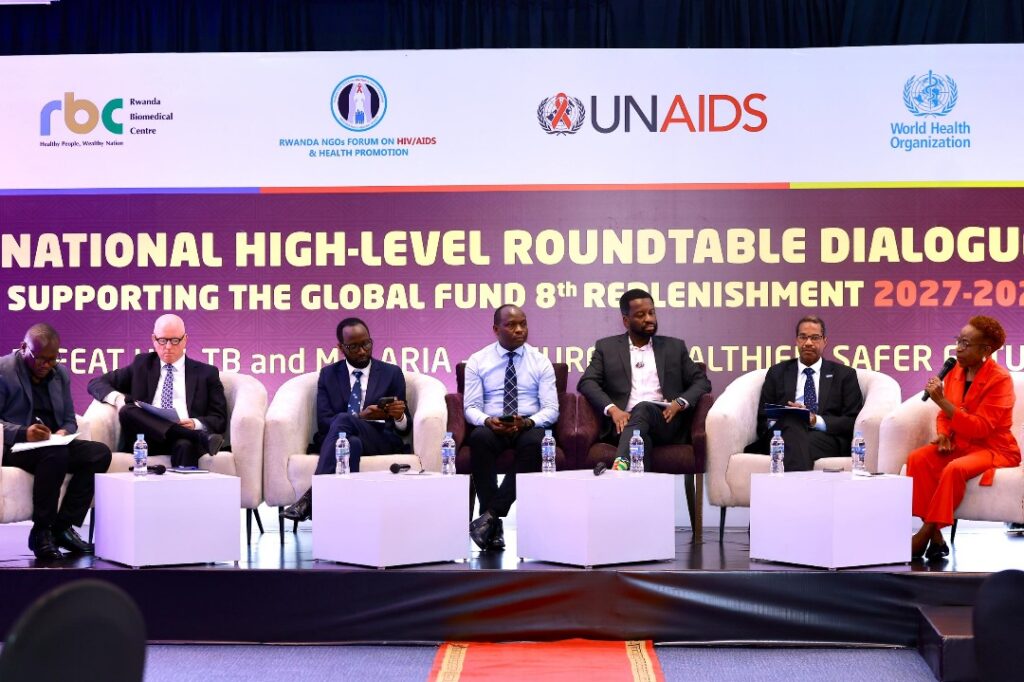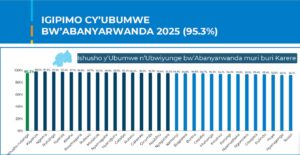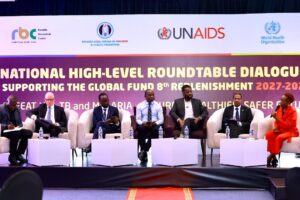By Elie Mutangana.
While HIV, tuberculosis, and malaria continue to ravage lives across communities predominantly in African countries, the Global Fund needs about $18 billion in aid replenishment to defeat the three diseases, build strong pandemic preparedness, and ensure health security in the next three years.
The message was addressed during the “National High-Level Roundtable Dialogue Meeting in Support of the Global Fund Eighth Replenishment 2027-2029” held on November 6, 2025, in Kigali. With the unprecedented reduction of aid from critical donors, actors in health warn that the fragility can happen if the fund is not secured.
“We are in a critical situation where the funding has shrunk while the health issues are still rising as usual. We have experienced unexpected threats from pandemics, including monkeypox, Marburg, and the deadliest Covid-19. We need to strategize and keep the momentum of fundraising.” said Bernard Muramira the chairperson of the Rwanda NGOs Forum on HIV/AIDS and Health Promotion.
He said while noting that although the recent pandemics have been combated, the existent threats from AIDS, malaria, and TB are still taking lives of people and impacting the economic development, especially in Sub-Saharan Africa.
According to reports, HIV, tuberculosis (TB), and malaria collectively killed approximately 2.3 million in 2023. In that regard, the Global Fund eyes its eighth replenishment summit to take place in South Africa on November 21, 2025, and will be co-hosted by the United Kingdom.
The summit will convene the G20 leaders and heads of state, civil society, communities, and the private sector to mark a powerful signal for defeating the three diseases and strengthening health security by collecting the necessary investment.
According to WHO Country Representative in Rwanda, Brian Chirombo, the African communities endured terrible experiences, but over time, the Global Fund partnership has enabled communities across Africa to make tremendous progress. He noted that the Global Fund partnership has saved nearly 70 million lives, resulting in a reduction of 63 percent since 2002. However, unfortunately, the progress is still fragile, according to him.
He said, “Today, the intersecting pressures of the economic headwinds that we are facing, the conflicts, and the climate crisis are testing our gains and resolve.” “70 million have been saved, but we obviously need to fast-track. We can’t continue at the same pace. Now we are looking to save 23 million additional lives and prevent more than 400 million infections between 2027 and 2029.” He added.
Ever since the Global Fund partnered with Rwanda in 2022, Isabelle Nizeyimana has been a living testament that the partnership has resulted in tremendous strides towards saving lives and restoring hope for life among persons living with HIV. She knew she was HIV positive in 2000. Her hope instantly vanished, and she started to despair.
“Being HIV positive at the time was like a death sentence. I imagined how my children would become total orphans and beggars after my death. There were no antiretroviral drugs in place. Some could hardly be imported from Uganda at a high cost.” She narrated.
According to her, a relief came when the Global Fund began operations in Rwanda. She and her peers started to receive treatment, even free of charge. 25 years have passed, living with the virus, taking the prescribed drugs, and thriving.
Not only her, but also other infected people were encouraged to embrace treatment after being influenced to do testing for knowing their status. “I would like to hail what the partnership has contributed over time in Rwanda. However, threats are still available and can become worse if gains are not upheld. That’s why we are calling for fundraising for the fund to ensure that we remain on the trajectory.” She said while commending the government of Rwanda for managing the resources well.
Rwanda firmly pledges an endless commitment to leveraging the investment, mobilizing domestic financing for maintaining the gain, and defeating the three epidemics.
According to Muhammed Semakula, the Permanent Secretary at the Ministry of Health, over 95% of people living with HIV know their status, are on treatment, and are virally suppressed. “The best way to achieve more than this is to do testing, know the status, and embrace treatment. Together, we can ensure that the gains we have made are not lost and the dream of ending HIV, TB, and malaria becomes a lasting reality.” He said.
By 2027, Rwanda aims to reduce new HIV infections by 15% and reduce HIV-related deaths. It also looks to decline TB deaths to 65% in 2035 compared with 33% recorded in 2015. For malaria, recent data reveal that the country has managed to reduce malaria cases by 88 percent. This means that severe cases declined from 18,000 in 2017 to 1,300 in 2023. Malaria-related deaths dropped from 600 in 2017 to 51 in 2023.
Theophile Sossa, Associate Specialist and Political and Political at The Global Fund, affirms that there are mechanisms in place to support partner countries to efficiently manage the fund and generate preferred. “We call for all African countries to continue strengthening the fund management and implementation systems to make sure that the resource that will be allocated to them will be used as efficiently as possible,” he said, similarly hailing Rwanda for its proper utilization of resources.
Just in July 2024, the Government of Rwanda, in partnership with the Global Fund, launched two new grants totaling Rwf 474 million to be allocated to introducing the long-lasting injectable PrEP, TB detection by using portable digital X-rays, and next-generation inspected-treated nets for HIV, TB, and malaria prevention, respectively.
To strategize and mobilize domestic investment, In February 2025, the Ministry of Health launched the fifth Health Sector Strategic Plan (HSSP), a comprehensive framework designed to strengthen Rwanda’s healthcare system and accelerate progress toward health coverage by 2030. Its implementation will cost approximately 6.9 trillion over the next five years, according to the Rwanda Biomedical Center (RBC).





